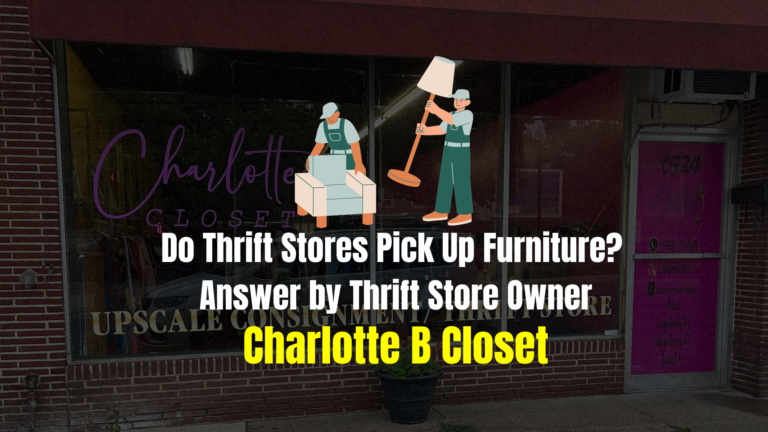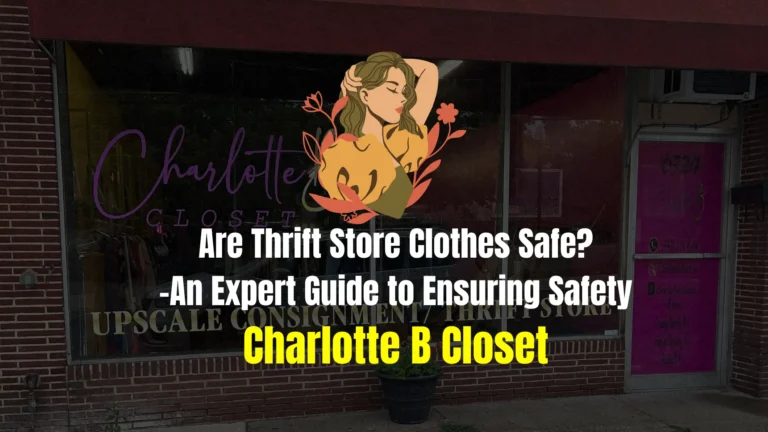Are Consignment Shops Worth It? – Unravel The Perks
Navigating the world of retail can be challenging, especially when looking for quality items without breaking the bank.
With rising concerns about sustainability and a growing interest in unique and vintage pieces, many consumers are turning to alternative shopping avenues. This leads to the burning question: are consignment shops worth it?
Consignment shops are attractive for those seeking sustainable, affordable, and unique shopping experiences. They offer avenues for profit through savvy buying and selling, with success hinging on choosing the right shop, understanding market trends, and leveraging relationships with knowledgeable shop owners.
Are Consignment Shops Worth It? – Quick Review
Absolutely, consignment shops are indeed worth exploring for a multitude of reasons. They provide a platform where buyers can discover unique, vintage, and branded items at affordable prices, contributing to sustainable living.
Sellers, on the other hand, can turn their pre-loved items into profit, guided by the shop’s expertise.
The blend of environmental benefits, economic advantages, and the thrill of finding one-of-a-kind treasures make consignment shops a delightful and rewarding retail alternative, especially for fashion enthusiasts looking for something beyond the ordinary.
Deciding the Worth of Consignment Stores for Sellers and Buyers
Consignment shops are thriving in many industries today, offering a fresh perspective on buying and selling goods. These shops have become an attractive avenue for fashion enthusiasts seeking designer pieces, antique collectors, and even tech-savvy individuals looking for electronics.
- Fashion: Consignment shops in the fashion industry offer high-end brands at a fraction of the cost. Whether it’s a vintage Gucci handbag or a limited-edition Rolex watch, fashion consignment shops create opportunities to own luxury items without the hefty price tag.
- Antiques: For antique lovers, these shops are treasure troves filled with unique and historical pieces. From ornate furniture to rare artifacts, antique consignment shops provide an authentic experience of owning a part of history.
- Electronics: These shops have also entered the electronic world, offering gadgets from various brands. It’s a way to acquire the latest technology without breaking the bank.
Comparison with Traditional Retail and Online Shopping
Consignment shops provide a unique shopping experience compared to traditional retail and online shopping platforms. Here’s how:
- Traditional Retail: Unlike traditional retailers, consignment shops don’t buy their inventory upfront. The sellers only get paid when the item sells. This leads to a more diverse and affordable selection for buyers, making it an exciting alternative to regular stores.
- Online Shopping: While online platforms offer convenience, consignment shops offer a tactile experience. You can see, touch, and even try items before purchasing. Plus, consignment shop owners often have expertise in the products they sell, providing personalized guidance and assurance of authenticity.
Factors Determining the Worth of Consignment Shops:
- Shop’s Reputation: Finding a well-established consignment shop with a solid reputation ensures quality and reliability.
- Item Condition: Inspecting items for wear and tear, authenticity, and overall condition is crucial for both buying and selling.
- Pricing Strategy: A fair pricing strategy balances the interests of both the seller and buyer, creating a win-win situation.
- Exclusive Addition: Geographical Location and Target Market: The success and appeal of a consignment shop often depend on its location and target market. Urban areas with fashion-conscious consumers might have thriving fashion consignment shops, whereas a market filled with history enthusiasts might lead to successful antique shops.
Balancing Pros and Cons to Assess Overall Value
Consignment shops present a unique and valuable option for both buyers and sellers. With their diverse offerings across various industries, they provide a personalized and authentic shopping experience.
However, success requires careful consideration of factors like the shop’s reputation, item condition, pricing strategy, and location. By understanding and navigating these elements, one can truly appreciate the worth of consignment shops.
Benefits of Buying from Consignment Shops
Here are some powerful perks of buying from a consignment shop you must know.
1. Environmental Benefits: Sustainable Shopping
One of the most appealing aspects of consignment shops is their contribution to sustainable shopping. Buyers are giving a second life to products by purchasing pre-owned items, reducing waste, and promoting a circular economy. This form of shopping saves resources and aligns with the growing global trend toward eco-conscious living.
In a time when fast fashion and mass production contribute to environmental degradation, consignment shops stand as a beacon for responsible consumption. By choosing to buy from these shops, consumers can positively impact the planet.
2. Economic Benefits: Affordable Pricing
Affordable pricing is another draw for consignment shop enthusiasts. High-quality items, often from renowned brands, are available at a fraction of the retail price. This makes consignment shops a haven for budget-conscious shoppers seeking style, quality, and value.
Whether it’s a designer dress worn only once or a vintage piece of furniture, consignment shops offer an opportunity to enjoy luxury without exorbitant cost. It’s a smart economic choice that opens doors to high-end products without sacrificing one’s budget.
3. Quality Assurance: Potential to Find Unique and Vintage Items
The thrill of discovering unique and vintage items is a major pull for consignment shop shoppers. Unlike traditional retail stores with mass-produced goods, consignment shops host a curated collection of one-of-a-kind pieces.
Whether it’s a mid-century modern chair or a rare first-edition book, the chance to find something truly special is a real possibility. These treasures often come with a story, adding an extra layer of value and charm. It’s an adventure for those who love the hunt and the joy of unique ownership.
4. Community Connection: Supporting Local Businesses
By choosing to shop at consignment shops, consumers actively support local businesses. These shops are often owned and operated by members of the community, fostering a sense of connection and shared values.
Supporting local consignment shops means investing in local economies and strengthening communal bonds. It’s a win-win situation where consumers get quality products, and the community thrives through local entrepreneurship.
5. Convenience: Multiple Options Under One Roof
Convenience is another key advantage. Consignment shops often house a wide array of items under one roof. From clothing to furniture, books to jewelry, shoppers can find multiple options without hopping from one store to another.
The curated nature of the goods heightens the convenience factor. Consignment shop owners often have a keen eye for quality, ensuring that the selection is diverse, appealing, and in good condition.
6. Exclusive Addition: Expertise from Shop Owners About Product Authenticity
A notable and exclusive benefit of consignment shops is the expertise they offer. Many consignment shop owners specialize in particular areas, whether it’s vintage fashion, rare antiques, or specific electronics.
Their expertise ensures product authenticity and quality. Buyers can rely on knowledgeable shop owners for guidance, education, and assurance that what they purchase is genuine and valuable. This relationship builds trust and elevates the shopping experience, distinguishing consignment shops from other retail options.
How Much Profit Can You Have by Shopping at Consignment Shops?
Consignment shops offer many opportunities for buyers to save and even profit. The ability to purchase high-end brands and quality items at a fraction of their original retail price translates into significant savings. For example, a designer dress that retailed for $1000 might be found for $300 in a consignment shop, saving 70%.
Moreover, savvy buyers often find items that increase in value over time. Collectible antiques, rare books, or limited-edition watches can be investment pieces. By understanding the market and choosing wisely, buyers can save money and invest in assets they appreciate.
1. Profit Margins for Sellers
Consignment shops provide sellers a platform to profit from items they no longer need or use. The shop’s business model involves selling items on behalf of the owner and taking a percentage of the sale as a commission. This percentage can range from 20% to 50%, depending on the shop and the item.
Sellers can profit by setting realistic prices based on the item’s condition, rarity, and demand. An antique piece purchased years ago might now fetch a much higher price. Clothing from sought-after designers might sell quickly and at a favorable profit margin. By understanding the market and collaborating with the right consignment shop, sellers can turn unused items into cash.
2. Strategies to Maximize Profit:
- Choosing the Right Shop: Different consignment shops specialize in different products. Choosing a shop that aligns with your item ensures that it reaches the right audience, increasing the chances of a successful sale.
- Understanding the Market Trends: Knowledge of current market trends enables both buyers and sellers to make informed decisions that can maximize profit. For sellers, it means pricing items competitively. For buyers, it means recognizing potential investment pieces.
- Properly Pricing Items: Finding the sweet spot in pricing is key. An overpriced item may not sell, while an underpriced item may yield less profit. Research, consultation with shop owners, and understanding the item’s value are vital in pricing it right.
3. Building Relationships with Shop Owners
Building relationships with consignment shop owners can lead to greater profits for buyers and sellers. Shop owners with expertise in specific areas can provide valuable insights into what to buy or how to price an item for sale. Regular customers may receive notifications about new arrivals that match their interests, giving them the first chance to purchase potential investment pieces. A strong relationship fosters trust, collaboration, and potential financial gains.
Case Studies and Real-World Examples of Successful Buying and Selling
Success stories abound in the world of consignment shopping. From the buyer who found a rare piece of art that was appreciated tenfold to the seller who turned a closet full of unused designer clothes into a substantial profit, real-world examples inspire and educate. These case studies are not just anecdotes but tangible proof of the profit potential in consignment shopping.
Tools and Apps to Help in Tracking Profits and Sales
In today’s digital age, various tools and apps facilitate consignment shopping for buyers and sellers. These platforms help track sales, profits, and market trends, making the process transparent and efficient. For sellers, this means real-time updates on sales and earnings. For buyers, it means access to a broader inventory and insights into potential investment pieces. By leveraging technology, consignment shopping becomes a more accessible and profitable endeavor.
also read about our detailed guide on:
Conclusion
The inquiry into whether consignment shops are worth it reveals a resounding affirmation.
These shops have emerged as more than just a shopping destination; they have become hubs for community connection, sustainability, and financial savvy.
Consignment shops cater to various needs and desires from the discerning collector to the budget-conscious shopper, from the seller looking to declutter to the eco-friendly consumer.
In an age where retail is rapidly evolving, consignment shops offer a timeless appeal, blending tradition with modernity, economy with luxury, and individuality with community.
Their worth is not just monetary but also embedded in the values they promote and the unique experiences they provide.
Whether in fashion, antiques, or electronics, consignment shops are worth the exploration, promising surprises, savings, and satisfaction at every turn.
FAQs
What Makes Consignment Shops a Worthwhile Shopping Option?
Consignment shops are worth it due to their diverse selection of unique and vintage items, often at affordable prices. They support sustainable shopping, offer opportunities for both buyers and sellers to profit, and foster community connection by supporting local businesses.
How Can Sellers Maximize Profit at Consignment Shops?
Sellers can maximize profit in consignment shops by choosing the right shop that aligns with their items, understanding market trends, properly pricing items, and building relationships with knowledgeable shop owners for insights and
What Differentiates Consignment Shops from Traditional Retail and Thrift Stores?
Consignment shops differ from traditional retail by offering pre-owned items on behalf of sellers, taking a commission on sales. Unlike thrift stores, consignment shops often curate higher-quality, branded products and provide expertise in pricing and authenticity.
Are Consignment Shops Suitable for Buying Investment Pieces like Antiques and Collectibles?
Yes, consignment shops are suitable for buying investment pieces like antiques and collectibles. They offer rare and valuable items at accessible prices, and experienced shop owners can provide expert guidance on potential investment opportunities.

Hi there, I’m Toni Whitten, but you might know me as LadyT. I’m a passionate entrepreneur and the proud owner of Charlotte B’s Closet, your go-to thrift store and upscale consignment.
Outside the store, I connect with the amazing women in my exclusive Facebook group, Housewives of Baltimore, boasting over 23k+ members.
In my free moments, I channel my passion for sharing genuine insights and helpful guides on various concerns through my blog at charlottebcloset.com.






